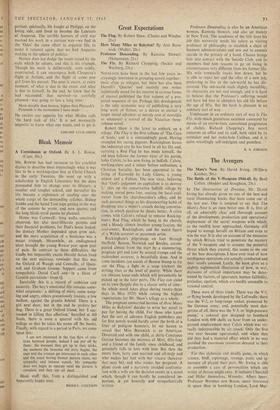Great Expectations
How Many Miles to Babylon? By Ann Boro- wick. (Muller, 20s.) Professor Descending. By Ramona Stewart: (Heinemann, 21s.) Novetts-rs have been in the last few years in- creasingly interested in grouping novels together: most often as trilogies, but there has also been Durrcll's 'Quartet' and recently one writer (admit(edly noted for his interest in various forms of excess) published the first volume of a pro- jected sequence of ten. Perhaps this development is the only economic way of publishing a very long work of fiction; or a device to extract a larger initial advance; or merely (out of nostalgia or whatever) a revival of the Victorian three- volume novel.
Robert Shaw is the latest to embark on a trilogy. The Flag is the first volume of 'The Cure of Souls,' and it is outstandingly good. Having strangled his racing pigeons, Rockingham leaves the industrial city 'he has lived in all his life and, carrying a Red Flag he has made himself, the old man follows the former vicar of his parish, John Calvin, to his new living in Suffolk. Calvin, • working-class and a miner before ordination, a Christian Socialist, has been appointed to the living of Eastwold by Lady Cleeve, a young widow and a Fabian. The new vicar, believing that 'God's judgment on capitalism is to destroy it,' stirs up the conservative Suffolk village by making rented pews free, ousting the local coal- owner from his churchwarden's office, and by such personal things as his disconcerting habit of dropping into a miner's crouch during conversa- tion, in which position he thinks better. A crisis comes with Calvin's refusal to remove Rocking- ham's Red Flag, which he hung in the church, and a bloody climax involves young fascists, the coal-owner, Rockingham, and the weird figure of a Welsh screever or pavement artist.
Rockingham's pilgrimage on foot through Sheffield, Boston, Norwich and Beccles, accom- panied almost from the start by a stammering, pregnant girl and later by several tramps and the malevolent screever, is beautifully done. And in some incidents (an ascent of Boston Stump to try out the Flag, a fight in a soup kitchen) the
writing rises to the level of poetry. While there are obvious loose ends which will presumably be picked up in the later parts, The Flag can stand on its own (largely due to a classic unity of time: the whole novel takes place during twenty-three days in May 1925) while raising the highest expectations for Mr. Shaw's trilogy as a whole.
The pregnant unmarried heroine of How Many Miles to Babylon? decides to write her novel to
pay for having the child. For those who know
that the sort of advance English publishers pay for first novels would hardly cover the birth of a
litter of pedigree hamsters, let me hasten to reveal that Miss Borowick is an American. Divorced and with one child, at thirty Constance Gorian becomes the mistress of Matt, fifty-four and a friend of the family since childhood, and genuinely falls in love with him. But then she meets Sam, forty and married and all-male and who makes her feel with her viscera (however that may be), and who makes her pregnant. A plane crash and a narrowly avoided confronta- tion with a wife are the decisive events in a novel which, though it can hardly be considered im- portant, is yet honestly and sympathetically written.
Professor Descending is also by an A merican woman, Ramona Stewart, and also set mainly in New York. The academic of the title loses his job (his university needs his salary as visiting professor of philosophy to establish a chair of business administration) and sets out to commit suicide in the privacy of a hotel. Chance brings him into contact with the Suicide Club, and its members find him reasons to go on living in circumstances very different from his former life. His wife eventually tracks him down, but he is able to reject her and the offer of a new job, preferring to live in the sub-world he has dis- covered. The sub-world reads slightly incredibly, its characters are not real enough, and it is hard to believe that the Professor's suffering would not have led him to abandon his old life before the age of fifty. But the book is pleasant in an ordinary sort of way.
Unpleasant in an ordinary sort of way is The Fly, with much gratuitous nastiness conveyed by means of an overwritten, convoluted progression of clichés. Richard Chopping's first novel concerns an office and its staff, both ruled by its caretaker and her stoke-hole Caliban, and it is quite revoltingly self-indulgent and pointless.
B. S. JOHNSON






























 Previous page
Previous page